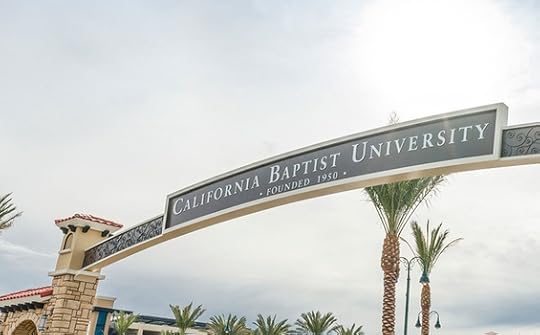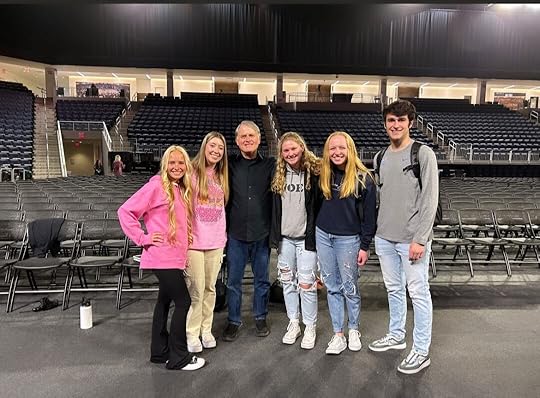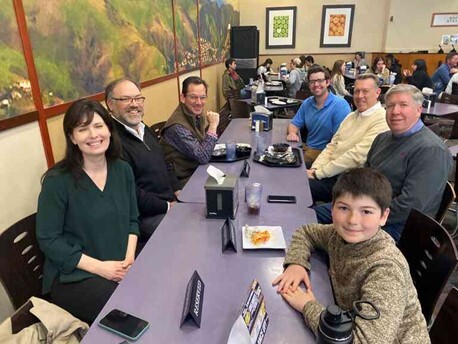Randy Alcorn's Blog, page 40
April 17, 2023
How Can We Avoid Becoming Cynics of the Cynicism and Negativity on Social Media and in the Body of Christ?

In a discussion with some friends about social media, one of them recently wrote, “It’s so difficult to wade through social media attacks and gang wars. That’s why I can’t bear to be on social media.”
I totally understand. Nothing makes me more cynical than listening to cynical people, and even though my cynicism is directed at them, it is still unhealthy.
I don’t read much social media, as I tend to be very selective, but as soon as I see people ganging up, whether or not I am sympathetic to some of their concerns, I stop reading. My feeling is that their comments are not about reality, but about them. Their cynicism, their weariness with life, and their judgmental spirit is poison, and I don’t think it’s helpful to drink poison, even if you think you’re immune to it.
Charles Spurgeon said, “Warm-hearted saints keep each other warm, but cold is also contagious.” How true that is, especially on social media.
I am generally pleased with my Facebook page, and the kinds of responses we get. (The fact that our EPM staff give an explanation or a link in the comments from time to time helps foster a more positive spirit.) Sure, there are always the people who didn’t actually read the article or maybe glanced at it and assume we’re saying something that we’re really not.
For example, someone posted in response to my blog article that they were surprised (and obviously disappointed) that I clearly didn’t know the whole story about some of the people in the Jesus Revolution film. Of course, that meant they hadn’t read the article. Sure enough, another commenter said something like “you obviously haven’t read the article, since Randy addresses that.” But then the person who made the criticism came back and admitted they hadn’t read the article and said that they now would. And I thought, sometimes critical readers actually are open to correction. It is always a beautiful thing to see people offer correction that turns around somebody’s thinking.
That encouraged me, but it also struck me once again how utterly ridiculous it is (and how embarrassed anyone should be!) to draw conclusions and make comments without even reading an article. I wonder sometimes if they assume that I don’t know about the bad stuff that also happened related to a given subject. It’s as if everything is black and white, and anything that happens must be all good or all bad. The blindness that goes with that approach to life is itself poison. To use a recent example, the Asbury revival must be all of God or all of the devil, and the moment I see anything that I think is of the devil (or God, for that matter), therefore it must all be.
This is why I find Romans 14–15 so comforting and encouraging. We can have different convictions, even in relatively significant areas, and still be united in Christ. But so much social media turns people into petty little arrogant presumptuous critics. It reminds me of what J.I. Packer said in Knowing God about the difference between travelers and “balconeers.” There are those people actually traveling the road of the Christian life, and there are those who don’t really walk the road; rather, they just sit up in the balcony and look down on those walking the road, and think their view allows them to understand what it means to walk the road.
I’m reminded of a story about a man who years ago was ready to make some terrible decisions. Several friends confronted and warned him. By God’s grace, he got counseling, and today he is closer to Jesus than ever. This had appeared to be an impossible situation, too late to turn around. Yet by God’s grace, it happened. God used voices of truth and grace in this person’s life, and he has now influenced many others for God’s kingdom.
This story helps me to have hope for struggling people tempted to reconstruct their faith, and hope for the body of Christ to be what Jesus intends it to be—full of genuine grace and truth. When I spend time with my small group and with Christ-centered friends, I come home refreshed instead of depleted. So if I find social media that refreshes me, as I sometimes do, I go for it. If it just drains and discourages or irritates me, I need to stay away.
A dear friend shared this memory:
Romans 15 is one of my favorite chapters of the Bible. Back in the ’90’s I was having a discouraging time and I called a dear friend to pray for me. She read Romans 15 to me on the phone, and the Holy Spirit just bathed me in the comfort of those words. I’ll never forget where I was sitting and what I was wearing and what I was thinking that night. Jesus took me from darkness into perfect light through His Word.
What a great memory to have. And what a great illustration, with all the people who hate the church, and always criticize it. We’ve all been touched by church people who were instruments of Jesus in our life. Let’s thank God for them! And humbly seek to be Christ-centered instruments of grace, truth, and encouragement in others’ lives, both online and in person.
Photo by Magnus Mueller
April 14, 2023
Trusting His Loving Purposes: My Message on Nanci, Suffering, and Heaven at California Baptist University

 On March 21, I gave a 30-minute chapel message at California Baptist University. They asked me to talk about suffering and Heaven, in light of Nanci’s homegoing, so I shared about Nanci and quoted from her journal. That date I spoke was actually the one-year anniversary of the day our family of 11 gathered around her bed, and Nanci spoke powerfully into our lives. A week later, she went to be with Jesus.
On March 21, I gave a 30-minute chapel message at California Baptist University. They asked me to talk about suffering and Heaven, in light of Nanci’s homegoing, so I shared about Nanci and quoted from her journal. That date I spoke was actually the one-year anniversary of the day our family of 11 gathered around her bed, and Nanci spoke powerfully into our lives. A week later, she went to be with Jesus.
After the chapel, I got to visit with the students who attended Sam Barlow High School, where I went to school in Gresham (as did our daughters and as do two of our grandsons). Ten Barlow graduates now attend there, and they all came up to say hi (that’s five of them in the photo). I knew most of them, and it was great to meet a few others.
 My daughter Karina and grandson David and I had lunch with five of the CBU profs, and it was the most delightful and encouraging time I’ve had on a Christian university campus in memory. There is an unapologetic affirmation of biblical truth and the critical importance of the local church and its pastors, something I have rarely seen at the many Christian liberal arts universities I’ve spoken at. Three of the five profs in the photo are current pastors. I found it refreshing and very encouraging. CBU is a rare example of a college that decades ago had lost its way (that’s not the rare part) but by God’s grace, and determination and hard work, returned to its biblical values. Our conversations were full of grace and truth. They say 1/3 of their students are solid growing believers, 1/3 are professing believers struggling with their faith to different degrees, and 1/3 are unbelievers. Hence, because they uplift Christ, the Bible, and the church, it’s a great place for young people in each of those categories.
My daughter Karina and grandson David and I had lunch with five of the CBU profs, and it was the most delightful and encouraging time I’ve had on a Christian university campus in memory. There is an unapologetic affirmation of biblical truth and the critical importance of the local church and its pastors, something I have rarely seen at the many Christian liberal arts universities I’ve spoken at. Three of the five profs in the photo are current pastors. I found it refreshing and very encouraging. CBU is a rare example of a college that decades ago had lost its way (that’s not the rare part) but by God’s grace, and determination and hard work, returned to its biblical values. Our conversations were full of grace and truth. They say 1/3 of their students are solid growing believers, 1/3 are professing believers struggling with their faith to different degrees, and 1/3 are unbelievers. Hence, because they uplift Christ, the Bible, and the church, it’s a great place for young people in each of those categories.
Here's my chapel message:
April 12, 2023
Heaven Celebrates Every Repentant Sinner

Philip Yancey tells a modern-day version of the prodigal son, about a girl with a nose ring and an attitude. She rebels against her parents, runs away, and becomes a drug-addicted prostitute in Detroit.
The months go by. She sees her face on a milk carton but never bothers to tell her family she’s alive. Then, two years later, she gets sick and desperate. Her pimp throws her out on the street.
All other alternatives exhausted, she calls home. She leaves a message, gets on a Greyhound, and shows up at the bus station, figuring she’ll scrounge a ride to her old house.
As she steps off the bus she finds herself greeted by forty people—brothers, sisters, uncles, aunts, cousins, grandparents, and her parents—all wearing party hats, with a huge banner stretched out saying, “Welcome home.”
Before she can finish saying “I’m sorry” her father murmurs, “Hush, sweetheart, we’ll talk later. We’ve got to get you home to the party; there’s a banquet waiting for you!”
Such abundant grace almost makes the parent look foolish, doesn’t it? Looking foolish is a risk God willingly takes in extending us grace. We expect Him to extract His pound of flesh, to make us grovel and beg. But He doesn’t.
In Jesus’s parable, when the prodigal’s father runs across the field to greet his repentant son, commentators point out that it was undignified for men in the ancient Middle East to run. But in his overflowing happiness, the father, who represents God, disregards his dignity to shower grace upon his repentant son.
Just before He told of the prodigal son, Jesus said, “there will be more rejoicing in heaven over one sinner who repents than over ninety-nine righteous persons who do not need to repent.” Again, He said, “there is rejoicing in the presence of the angels of God over one sinner who repents.” By putting on his own joyful party, this earthly father is mirroring the heavenly Father’s joyful party in Heaven over a beloved image bearer entering His family. Those in Heaven see and celebrate conversions on earth. Heaven throws a party for every sinner who repents. When God celebrates in Heaven, surely His people should celebrate on Earth!
Unfortunately, while living in the Father’s house (perhaps in Christian families and churches), we can dutifully go through the motions of exterior righteousness while resenting God’s extravagant grace in others’ lives and refusing to enter into His happiness over them. Instead, like the joy-filled, forgiving father who throws the party for his repentant son, we should celebrate God’s grace in the lives of our fellow prodigals.
Sinners embracing God’s grace means it’s party time in Heaven. And it should mean party time on earth.
See Randy's books Happiness , Heaven , and The Grace and Truth Paradox.
Photo by Erwan Hesry on Unsplash
April 10, 2023
Christ’s Resurrection Means Our Old Bodies Will Be Made New

In 1 Corinthians 15:17-19, Paul says that if Christ hadn’t risen from the dead, we’d still be in our sins—meaning we’d be bound for Hell, not Heaven: “If Christ has not been raised, your faith is futile; you are still in your sins. Then those also who have fallen asleep in Christ are lost. If only for this life we have hope in Christ, we are to be pitied more than all men.”
He doesn’t just say that if there’s no Heaven, the Christian life is futile. He says that if there’s no resurrection of the dead, then Christianity’s hope is an illusion and we’re to be pitied for placing our faith in Christ. Paul has no interest in a Heaven that’s merely for human spirits.
Wishful thinking is not the reason why, deep in our hearts, we desire a resurrected life on a resurrected Earth instead of a disembodied existence in a spiritual realm. Rather, we desire it precisely because God intends for us to be raised to new life on the New Earth. It is God who created us to desire what we are made for. It is God who “set eternity in the hearts of men” (Ecclesiastes 3:11). It is God who designed us to live on Earth and to desire the earthly life. And it is our bodily resurrection that will allow us to return to an earthly life—this time freed from sin and the Curse.
“Therefore, if anyone is in Christ, he is a new creation; the old has gone, the new has come!” (2 Corinthians 5:17). Becoming a new creation sounds as if it involves a radical change, and indeed it does. But though we become new people when we come to Christ, we still remain the same people.
Conversion is a blend of change and continuity. When I became a Christian as a high school student, I became a new person, yet I was still the same person I’d always been. My mother saw a lot of changes, but she still recognized me. She said, “Good morning, Randy,” not “Who are you?” I was still Randy Alcorn, though a substantially transformed Randy Alcorn. My dog never growled at me—he knew who I was.
Likewise, this same Randy (who is now very different) will undergo another change at death. And I will undergo yet another change at the resurrection. But through all the changes I will still be who I was and who I am. There will be continuity from this life to the next. I will be able to say with Job, “In my flesh I will see God; I myself will see him with my own eyes—I, and not another” (Job 19:26-27).
Conversion involves transforming the old, not eliminating it. Despite the radical changes that occur through salvation, death, and resurrection, we remain the unique beings that God created. We have the same history, appearance, memory, interests, and skills. This is the principle of redemptive continuity. God is not going to scrap his original creation and start over. Instead, He will take His fallen, corrupted children and restore, refresh, and renew us to our original design.
If we don’t grasp the principle of redemptive continuity, we cannot understand the nature of resurrection. “There must be continuity,” writes Anthony Hoekema, “for otherwise there would be little point in speaking about a resurrection at all. The calling into existence of a completely new set of people totally different from the present inhabitants of the earth would not be a resurrection.”
First Corinthians 15:53 says, “The perishable must clothe itself with the imperishable, and the mortal with immortality.” This (the perishable and mortal) puts on that (the imperishable and immortal). Likewise, it is we, the very same people who walk this Earth, who will walk the New Earth. “We will be with the Lord forever” (1 Thessalonians 4:17, emphasis added).
The empty tomb is the ultimate proof that Christ’s resurrection body was the same body that died on the cross. If resurrection meant the creation of a previously nonexistent body, Christ’s original body would have remained in the tomb. When Jesus said to His disciples after His resurrection, “It is I myself,” He was emphasizing to them that He was the same person—in spirit and body—who had gone to the cross (Luke 24:39). His disciples saw the marks of His crucifixion, unmistakable evidence that this was the same body.
Jesus said, “Destroy this temple, and I will raise it again in three days” (John 2:19). John clarifies that “the temple he had spoken of was his body” (v. 21). The body that rose is the body that was destroyed.
In its historic crystallization of orthodox doctrine, the Westminster Larger Catechism (1647) states, “The self-same bodies of the dead which were laid in the grave, being then again united to their souls forever, shall be raised up by the power of Christ.” The Westminster Confession, one of the great creeds of the Christian faith, says, “All the dead shall be raised up, with the self-same bodies, and none other.” “Self-same bodies” affirms the doctrine of continuity through resurrection.
This, then, is the most basic truth about our resurrected bodies: They are the same bodies God created for us, but they will be raised to greater perfection than we’ve ever known. We don’t know everything about them, of course, but we do know a great deal. Scripture does not leave us in the dark about our resurrected bodies.
Because we each have a physical body, we already have the single best reference point for envisioning a new body. Likewise, the New Earth will still be Earth, but a changed Earth. It will be converted and resurrected, but it will still be Earth and recognizable as such. Just as those reborn through salvation maintain continuity with the people they were, so too the world will be reborn in continuity with the old world (Matthew 19:28).
Excerpted from Randy's devotional 50 Days of Heaven .
Photo by Edu Grande on Unsplash
April 7, 2023
Jesus Accomplished the Healing from Sin We Need, Even More Than Healing from Cancer

I miss Nanci every day, but I am profoundly thankful for the tremendous example she left me, and the way she mentored me and discipled me as she actively pursued God. She received from Him dying grace so powerful that at times it was startling. What a privilege to have seen it and her close up.
In the journal she kept throughout her cancer years, Nanci wrote these reflections about the healing Jesus accomplished on the cross:
“But he was pierced for our rebellion, crushed for our sins. He was beaten so we could be whole. He was whipped so we could be healed. All of us, like sheep, have strayed away. We have left God’s paths to follow our own. Yet Yahweh laid on him the sins of us all” (Isaiah 53:5-6 NLT, emphasis added).
This is the healing that really matters. I needed, and have received in full measure, a healing from my guilt and sins. No physical healing compares to complete spiritual healing.
We were all born with stage-four guilt and sin. Nothing we could do ourselves could cure it. No “treatments” performed by mankind are effective for its eradication.
God has provided a cure only He can administer. “Yahweh laid on Christ the guilt and sin of us all.” Our guilt and sin are not incurable! We can be healed because Christ provided the only treatment; and He took the treatment for us. He was our substitute in the infusion room, in the radiation room, and in the operating room. The treatment was radical, and the cure was permanent.
Praise God for my healing from guilt and sin! Any CT or MRI of my soul would reveal “no evidence of sin.” I have been given eternal life. Nothing can cause guilt to metastasize in my soul. I am cleared permanently to enter into God’s presence. This is the promise that brings me pure joy and complete hope every day.
Later she wrote:
I have been so focused on God annihilating my cancer that my focus has not been on the blessed truth that He has annihilated my sin! My body (pre–Resurrection) is a gift from God—but most surely a temporary gift. So far, it has served me for close to 67 years. My soul, my very existence, is also a gift from God—and most surely an eternal gift. (And one day He will resurrect and heal my body, permanently.) I want my focus to be on God’s saving grace! God has accomplished the work of redemption for my soul. He has thoroughly and eternally saved me! I don’t need to worry that someday a “scan” or some other test will reveal anything that threatens my soul. Jesus has cured me eternally of my sin and given me eternal life. And no one can snatch me out of His redemptive hands!
I pray for a day when my fight against cancer is won. Praise God that the battle for my soul is already won!
And:
The physical wounds on Christ’s body brought healing to our wounded souls. I have been praying for physical healing from cancer for over three years. However, my greater—my ultimate—need is healing from sin. Jesus has accomplished that! My physical needs pale in comparison with my spiritual needs. My eternal soul is reconciled to God forever because Christ paid the penalty for my sins.
May Nanci’s closing prayer be true of us all: Lord, please give me an even deeper sense of gratitude and awe for my position in Christ with God.
For more on Christ's sacrifice for us, see Randy's books It's All About Jesus and Face to Face with Jesus.
Photo by Christi Marcheschi on Unsplash
April 5, 2023
Kids, Questions about Heaven, and Humor over Hamburgers

Martin Luther said, “It is pleasing to the dear God whenever thou rejoicest or laughest from the bottom of thy heart.” And who does that more frequently and sincerely than children? Talking to kids about Heaven was the focus of an interview I did with Greg Laurie, senior pastor of Harvest Christian Fellowship, for his radio program about my book Heaven for Kids.
Greg and his wife Cathe certainly get how tough life can be. Years ago, Greg called me after his son Christopher died to talk about Heaven, and we have talked about Christopher and Heaven many times since. I always enjoy our conversations, in part because we talk about deep and meaningful subjects, including grief and suffering, but we also have a lot of fun together.
At the end of the interview, Greg and I spent some time ribbing each other. I asked his permission while we were recording to use some of the humorous outtakes, which wouldn’t be included in the official Harvest broadcast, and put them on our website. I thought people might enjoy hearing the kinds of things that are done in interviews that never make it to the public, but are just harmless fun.
As the years have passed, God has enabled me to experience more frequent times of happiness even in the midst of difficulties. His gift of laughter is a huge part of that; in fact, sometimes it’s like a ladder that helps me climb out of deep holes. A close friend once told me, “I always know when you’re hurting. You joke and laugh more.”
I will grant that I am an unusual person; however, Greg is one of the most unusual people I have ever known! Several years ago when I was visiting Harvest Church, at each of the three services, he introduced me and announced I had written a “new” book. These are the three titles:

Years later, we’re still joking about burgers. In fact, Greg asked me about hamburgers in Heaven at the end of our interview, and he recently shared that clip from our EPM website on Twitter. Unfortunately, a few commenters didn’t seem to understand that we were having fun. One said, “Seriously?” Another said, “I only care about seeing Jesus in Heaven. Anything else is superfluous and irrelevant.”
I do, in fact, believe there are a lot more important questions about Heaven to cover than whether we’ll eat hamburgers! But as Charles Spurgeon said, “Those who are ‘beloved of the Lord’ must be the most happy and joyful people to be found anywhere upon the face of the earth.” And I believe it pleases Jesus when, in childlike faith, we delight in and look forward to the wonderful home He’s prepared for us.
You can listen to my full interview with Greg, or listen to the parts that interest you below:
2. Is Heaven going to be a boring place?
5. What is Heaven? Where is Heaven? Most importantly, how do we get to Heaven?
7. Will we be different than angels in Heaven? Do we become angels?
8. When a child experiences death and loss, is that a good time to begin a conversation about Heaven?
9. What happens to pets when they die? Might there be talking animals in Heaven?
10. Should children's understanding of Heaven be based on a progressive explanation?
11. What is the most challenging question to answer about Heaven? What about sports in Heaven?
12. How can investing in others' success during playing sports be a preview of Heaven?
13. When you order a burger, what do you order on it? Will there be hamburgers in Heaven?
Photo by Polina Tankilevitch
April 3, 2023
How Can We Remain Humble While Pursuing Humility?

Note from Randy: C. S. Lewis said of the humble person, “He will not be thinking about humility: he will not be thinking about himself at all.”
Tim Keller, echoing Lewis, says, “Gospel-humility is not needing to think about myself. . . . I stop connecting every experience, every conversation, with myself. In fact, I stop thinking about myself. The freedom of self-forgetfulness. The blessed rest that only self-forgetfulness brings.”
As commendable as such humility is, we can never achieve it simply by willing it to appear. Otherwise, we’ll be thinking about ourselves and our valiant attempts to be humble. What we need is to be so gripped by Jesus and His grace that we truly forget about ourselves. Why would we want to think about ourselves, the lesser, when we can think about Him, the infinitely greater? This happens directly, when we worship and serve Him, and also indirectly, when we love and serve others for His glory.
Below are some helpful reflections on humility from Gavin Ortlund, related to his new book Humility: The Joy of Self-Forgetfulness.
The Deceptively Easy Path to Prideful Humility
The Danger of Self-Preoccupation
There is a danger, in thinking about humility, that we can become so self-preoccupied in the process, and it kind of defeats the point. It's actually kind of funny if you think about it. There's a passage in The Screwtape Letters by C. S. Lewis when Demon is counseling another demon, and he's saying, See if you can get your patient [the human being] to be proud about his own efforts at humility.
And that is a real danger. We can start thinking, Wow, I'm being really humble right now. Tim Keller has said humility is so shy that when you start talking about it, it goes away. And so that's one danger in one direction.
Think on and Pursue Humility
On the other hand, I don't think it's right to say we should just never think about humility in any way. There are verses in the Bible that call us to be humble. Philippians 2 says, “in humility, consider others better than yourself." That word humility is there. We need to know what that means in order to obey that verse and so many others, so that means we need to think a little bit about what this calling is.
Throughout church history, there's been so much reflection about the nature of humility. You think about Thomas Aquinas and Saint Augustine and some of these great Christians who wrote at great length about the nature of humility. They reflected on it. What is the nature of this virtue? Basil of Caesarea wrote a famous homily on humility. Jonathan Edwards preached many sermons on humility. So I don't think it's right that we shouldn't think about it at all.
What helps me steer between the two dangers here is that we should pursue humility. Think about humility, but just be aware that there's the temptation to become self-focused in the process, to take ourselves too seriously in the process, to start becoming self-preoccupied or to just be thinking about how we're doing in the process too much. And a good acid test is to ask, Is humility leading me to joy?
Joy cannot be faked. Joy is an authentic experience that comes from true humility. And counterfeit forms of humility don't lead to joy. So, as we're trying to navigate between a self-preoccupied, artificial kind of humility on the one hand and avoidance of humility on the other, a good acid test will be to ask, Is what I'm pursuing leading me to joy? Is it leading me to a greater love for Christ, a greater concern for my neighbor, or even just a greater awareness of the world around me?
That’s a good test for whether this is real and authentic humility.
This article originally appeared on Crossway and is used with the author’s permission.
Photo by Aravind Kumar on Unsplash
March 31, 2023
A Brief Interruption in Our Relationship: Our Daughter Angela’s Reflections about Her Mom

Note from Randy: My youngest daughter Angela wrote the following about her mom on September 28, the six-month anniversary of Nanci’s homegoing. I love what she wrote here.
March 28 marked the one-year anniversary since Nanci relocated to Heaven. This week our family has been all together—both our daughters Karina and Angela and their husbands, and all five of our grandsons. We have all been looking forward to gathering and remembering and celebrating Nanci.
I’ve been reading through texts and emails and social media comments in relation to the first anniversary of Nanci’s homegoing. It’s struck me how many people say it’s been six months, a year, or 18 months since their loved ones went to Jesus. This is a club none of us wants to join but nearly all of us will one day be part of. Hence, it’s best to go deep in God’s Word, and draw close to Jesus now as Nanci did, so we are ready when the time comes. I read to my whole family this week from Nanci’s journals, sitting between two of my grandsons. So heart-touching to see her “boys,” as she always called them, instructed and inspired by her profound words. (Same for our daughters and sons-in-law and me.)
A Brief Interruption in Our Relationship:
Our Daughter Angela’s Reflections about Her Mom
Today marks six months since my mom died. This loss has affected me in profound ways, and in ways I know I still have yet to discover. But today I don’t want to talk about me. I want to talk about my mom.
I don’t have a great memory, but the first memory I can recall vividly was from when I was very young. I was sitting on my mom’s lap with my head resting on her chest. As I listened to the rhythm of her heartbeat and the sounds of her breathing, I felt totally peaceful and content. I was just about to drift to sleep when suddenly, Mom starts screaming and yelling. I was instantly terrified and started to cry. Quickly, she pulled me close and said, “Oh honey, it’s OK, mommy’s OK, mommy’s just really excited about this football game!”

And that, in a nutshell, was my mom.
She had this way of making everyone feel comfortable and at ease around her, and at the same time, everyone knew not to stand in the way of her passion for life and the things she loved!
She was the fun mom, the one that all my friends loved and wanted to be around. She was a teacher assistant one day a week at our school from kindergarten to 8th grade, and all my classmates thought she was the best. Any weeks she wasn’t able to come, I’d hear moaning about how much everyone would miss her, and how no TA was more fun at recess than Mrs. Alcorn.
She made our house a place we all wanted to be. She may have thought it was the pizza rolls and Nutter Butter’s that kept our friends wanting to come over, but I know that it was because my mom created a home where everyone knew there would be both a lot of love and a lot of laughter.
There was SO much laughter! I remember laughing until my sides ached the first time I read some old Reader’s Digest magazines to my mom at the family beach house in Manzanita (which quickly became a tradition). You may be thinking I’m talking about the sections that included family friendly jokes and clever anecdotes. Now, I did read those, and we’d chuckle a bit. But the real belly laughs were reserved for the times I read her Drama in Real Life. I’d put on my best dramatic voice and read such things as people who crawled miles to safety after a grizzly bear mauling, or the harrowing tale of a shipwreck turned shark attack. It sounds so awful that we would laugh at these things, but all of these were survival stories, so we weren’t laughing at people actually dying, just NEAR death experiences that were written using the most intensely dramatic words possible. The tales that seemingly couldn’t possibly get worse, but ALWAYS did. There was the “lost in the rainforest” story where this guy was starving and needing to eat bugs, then there was a flash flood but finally he barely pulled himself out of the water, climbing up on a tree branch. But wait, there’s more…we were snorting by the time the fire ants arrived. Dad and Karina would be over in the corner discussing philosophy and theology, and we were rolling on the floor laughing at the detailed description of what in real life would be a terrible thing, but in the overly dramatic telling of the story, somehow became humorous to us.

The beach house also reminds me of birthday trips. For many years in a row, my mom would let me pick a few friends and she (and sometimes one of her friends) would drive us to Manzanita for a birthday weekend. We’d roast hot dogs and s’mores on the beach and watch movies and go to Seaside. My mom was always a part of the fun, even during my potentially angsty middle school and high school years, and I always wanted her to be.
Not only was my mom the fun mom, I also remember serious conversations that were packed with godly wisdom. I remember many of them taking place either in the car, or walking around the middle school track. But sometimes, the best conversations would just happen randomly. I’d just plop down on the couch with her after school, or come in the kitchen and help her make dinner. She taught me so many things without me even knowing it.
I really never remember a time that I felt like my mom wasn’t there. Even in my adult years. We weren’t the mother-daughter pair that talked daily on the phone after I left the house…in fact, I joke with people that we lived less than a mile apart for the last 14 years, and sometimes we’d go for weeks without saying a word to each other! But that was because I knew without a doubt that she was there whenever I needed her. It was both spoken and unspoken that I could always count on her to be present in my life.
My mom and I were different in some ways, but similar in more. We both wanted to be easygoing and never a burden to those around us. We didn’t want to be needy; we wanted to be strong and capable, and we don’t like to cry in front of others (though that’s out the window for me these days). We would often exchange looks and instantly know what the other was thinking. We understood each other in a very special way, and that made me feel like I could tell her anything at any time without any caveats. I miss that more than I can describe.
In the last few years, as often happens with parents and children, our roles slowly started to reverse. I had a lot of medical problems as a teenager, and had to have several surgeries. Stopping to write these things down, it’s pretty remarkable to look back: my mom went to countless doctor appointments with me, sat in the ER with me several times, and even after I was married, got a few phone calls from me that held difficult news about my health. She helped me get out of bed after surgeries and brought me my favorite things without me even asking.
One of the greatest privileges of my life is that I was able to take care of my mom in her last few years, the last month of her life especially. It was my turn to take her to doctor appointments. I was the one on the receiving end of several difficult phone calls. I sat by her bedside while she was on the ER stretcher. I came to visit her while she was admitted to the hospital. I went to the grocery store to get her what she needed, and also splurged on her favorites. At the end, I was able to do for her for three weeks what she did for me my whole childhood.
I have realized that many moments—both big and small—in my life led me to become the person my mom needed me to be in those last moments we shared. For that, I will forever be grateful to God. As a nurse, I helped interpret the words of the doctors, and as a daughter who resonated with her personality, I was able to express them in a way that she understood. Having been a patient, I knew firsthand her reluctance to ask for help, especially from those closest to her. My training as a nurse and my experience working in critical care prepared me for such a time as this.
Right before I made the decision to call 911, 3 ½ weeks before she died, I knelt down next to her and said I knew she didn’t want for me to have to take care of her at the end of her life. But then I told her that not only was I willing to do that, it would be an honor and a privilege. She looked at me and said, “Are you sure?” and I said, “Absolutely.” And then she took a slow breath and said, “OK. Thank you.” And I knew she knew the end was closer than any of the rest of us realized.
I am so grateful that in all my years of experience as a nurse, with all of the different tasks I’ve done for each of the patients I have taken care of, God was preparing me to be able to give the most important patient of my life the very best care I could give. And every day as I was taking care of her, I also made her laugh, which was important to us both. Her allowing me to care for her until the very end was her greatest gift to me, and I am so, so, so thankful.
I miss so many things about my mom. I miss her laugh, and the twinkle in her eye that she had until the very end. Her facial expressions that ensured she’d never be a good poker player. Her whistle I could hear from blocks away that told me it was time to come home for dinner—the same whistle used years later to cheer on my boys at their sporting events. The silly songs she’d make up and sing about her dogs. Her wise words in quiet moments. The pictures of her toes in the sand that she’d send me from Maui. The weeks that would go by without even a phone call, but the knowledge that I could stop by and see her at a moment’s notice anytime I wanted.

I am so very grateful it’s not the end of our relationship, but only a brief interruption. And I can’t wait for an eternity of laughter reminiscing about both others’ and our own Dramas in Real Life, and being able to lay close to my mama again, listening to the comforting sound of her fully healed lungs breathing in the purest air on the New Earth.
“And I heard a loud voice from the throne saying, ‘Behold, the dwelling place of God is with man. He will dwell with them and they will be his people, and God himself will be with them as their God. He will wipe away every tear from their eyes, and death shall be no more, neither shall there be mourning, nor crying, nor pain anymore, for the former things have passed away.’ And he who was seated on the throne said, ‘Behold, I am making all things new.’” (Revelation 21: 3-6)
Until that day, this stone with my mom’s handwriting on it (a precious gift from Dan’s co-workers) reminds me that God is my strength. He will be faithful to guide me through these deep valleys of grief and remind me of the joy that awaits me someday soon. The fullness of joy that my mom is experiencing right now.

I love you, Mama, and I can’t wait to share forever with you. I can almost hear you whistling me home.
March 29, 2023
We Could Never Earn God’s Grace

Through a set of divinely arranged circumstances, years ago I drove home a university professor I’d just met from a theatre parking lot. When we met again several months later, two hours before he came to Christ, he said, “I can’t get past the idea that someone could live a selfish, no-good life, then repent on his death bed and go to Heaven. It just sounds too easy, too cheap.”
I challenged his underlying assumption, that we can earn Heaven. We discussed the hardest part about grace—swallowing our pride and saying, “I don’t deserve this any more than that criminal does.”
Grace was enormously expensive for God. Yet there’s just nothing we can offer to pay for it.
A thief on the cross asked Jesus to save him. Though every spoken word was agony, Jesus answered him, “I tell you the truth, today you will be with me in paradise” (Luke 23:42-43).
This thief would never be baptized, make restitution, attend church, take communion, sing a hymn, or give an offering. He had nothing to offer Christ, no way to pay him back.
Neither do we.
Imagine a King who invites you to come live in his house and be his heir, even though you rebelled against him, and murdered his son. Suppose you worked hard, saved up money, then came to the King and said, “Here. I’m paying you back.”
Imagine the King’s response. You can’t begin to pay him back. The very attempt is an insult. It cheapens his son’s death.
On the other hand, some people take advantage of grace, reducing it to an excuse for sin. Jude writes: “For certain men whose condemnation was written about long ago have secretly slipped in among you. They are godless men, who change the grace of our God into a license for immorality” (Jude 4).
Any concept of grace that makes us feel more comfortable about sinning is not biblical grace. God’s grace never encourages us to live in sin; on the contrary, it empowers us to say no to sin and yes to truth. It’s the polar opposite of what Dietrich Bonhoeffer called “cheap grace.”
God has seen us at our worst and still loved us. No skeletons will fall out of our closets in eternity. God won’t say, “Well, if I’d known that I never would’ve let Randy into Heaven!” God knows all my sins. Jesus died for them all. No exceptions.
For more on this topic, see Randy’s book The Grace and Truth Paradox , and his devotional Beautiful and Scandalous .
Photo by Luis Quintero
March 27, 2023
The Great Reunion Awaits: Reflections a Year After Nanci Entered Heaven

A year ago tomorrow, on March 28, 2022, I said goodbye—for now—to my wife, Nanci, who was also my partner, soulmate, and best friend. The pilgrimage of grief, though full of learning and enrichment, is one I would gladly exchange to have my wife with me again. And yet…not really, because I recognize God’s sovereignty and love, and His perfect plan, and the fact that my wife is now happier than she has ever been.
Nanci experienced firsthand the closeness of Jesus in her suffering. She wrote in her journal, “My relationship with God has deepened more than I ever could have imagined during this cancer. I have tasted and seen that the Lord is good! [Psalm 34:8] I trust and cling to Him more. I worship Him more. I love Him more! The Bible speaks to me more. The Holy Spirit’s ministry feels more real to me.”
Alive in Christ’s Presence
I often picture Nanci’s entry into Jesus’ presence a year ago. I imagine that while Jesus was Nanci’s center of attention, she also loved seeing relatives who had died—her mother and father and my parents, and our grandchild she’d not yet met, taken into Heaven before birth.
One of the truths I so love is that while Nanci went ahead of me to the present pre-resurrection Heaven, which is “better by far” than this earth under the curse, one day we will all be raised to life on the New Earth. There, John says of our Lord, “He will wipe every tear from their eyes. There will be no more death or mourning or crying or pain, for the old order of things has passed away. He who was seated on the throne said, ‘I am making everything new!’ Then he said, ‘Write this down, for these words are trustworthy and true’” (Revelation 21:4-5).
On that day, Nanci and I—and all of God’s risen people—will behold “the river of the water of life, as clear as crystal, flowing from the throne of God and of the Lamb down the middle of the great street of the city. On each side of the river stood the tree of life, bearing twelve crops of fruit, yielding its fruit every month. And the leaves of the tree are for the healing of the nations. No longer will there be any curse. The throne of God and of the Lamb will be in the city, and his servants will serve him. They will see his face…” (Revelation 22:1-4).
Can you imagine what it will be like for us all together—people of every tribe, nation, and language—to behold and experience at last the place that the Carpenter from Nazareth, infinitely creative and powerful, has prepared for us? Wow!
She Still Speaks
My friend Steve Silver speaks of his wife Sandy, now with Jesus, as his silent partner. He has the memories how she “would weigh in on decisions, encourage me in plans, guide me in right actions, and be an advocate for everything done for the Lord.”
I so relate. Nanci is my silent partner every day. And yet in another way, she is not silent. Hebrews 11:4 says, “And by faith Abel still speaks, even though he is dead.” Nanci still speaks to everyone who knew her here. And she speaks to those she’s been reunited with and has met for the first time. And she will forever speak, and one day I will hear not just memories of her voice, but her real present tense voice, more delightful than ever.
In the meantime, grief has become my friend and God’s anvil to work on me. I didn’t ask grief to come into my life because grief only comes with loss, and who asks for loss? But loss will come uninvited, and I’ve learned good grief can help us move forward through our losses, becoming more like Jesus in the process…if we let it.
“For our light and momentary troubles are achieving for us an eternal glory that far outweighs them all” (2 Corinthians 4:17). My deep pain in having to face this fallen world without Nanci isn’t just suffering for me to get beyond; it is suffering that is purposeful, achieving what’s of eternal value. Because that’s true, the next verse says, “So we fix our eyes not on what is seen, but on what is unseen. For what is seen is temporary, but what is unseen is eternal” (2 Corinthians 4:18).
The Legacy of an Eternal Perspective
I am so grateful that Nanci and I talked about Heaven openly and often over decades, and I would encourage you to do the same. Believing her death was coming soon, Nanci asked me if I would bring together our family of eleven—our two daughters and their husbands, and our five grandchildren. She wanted to speak into all our lives, and we gathered two days later. She spoke to her grandchildren especially, with tenderness and humor, and encouraged them never to resent God for taking her, because God always knows best and works even hard things for our eternal good. When she could speak no longer because of exhaustion, I read to the family from her journals. All of us were deeply touched. There were many tears, but also laughter, and it was Nanci’s laughter that gave permission and blessing to ours.
One of our 17-year-old grandsons said, “Grams, if you can trust God like this when facing such hard things, I know I can trust him too in the tough times I face.” Another said, “I will never forget what you said to us today.” We placed our hands on her and prayed over my wife, and our daughters’ mother, and our grandsons’ Gramma. It was a sacred time in which we caught glimpses of a far better world that she already had one foot in. What we experienced that day made me realize that none of us needs to wait until we think we’re dying to gather and talk to our family as Nanci did. I’ve since encouraged others to consider doing this sooner rather than later.
I’d thought a great deal about Heaven before Nanci died, having written seven books about it. But while what I learned during those hundreds (come to think of it, thousands) of hours spent on research and writing was a great encouragement, it didn’t make saying goodbye to Nanci easy. All that study, however, bolstered my wholehearted belief that Nanci’s death was not the end of our relationship, only a temporary interruption. The great reunion awaits us, and I anticipate it and delight in imagining it with everything in me.
Jesus kindly delivered Nanci from her suffering. To know my sweetheart will never suffer another moment for all eternity brings tears of joy as I write these words.

She Is Home
When Nanci left for Heaven, part of me left with her. Other than Jesus, the greatest treasure I’ve ever had on Earth is Nanci. And Jesus said, “Where your treasure is, there your heart will be also.” Because Jesus is in Heaven, and He is my greatest treasure, my heart has long been there. But with Nanci there, as much as I love all my family and friends and church, my heart and mind are often in that other place. I’m encouraged by the command, “Set your hearts on things above, where Christ is, seated at the right hand of God. Set your minds on things above, not on earthly things” (Colossians 3:1-2).
I’m grateful God still has a place for me as long as I’m here. Yet I deeply miss Nanci’s daily presence. I find myself instinctively wanting to do things I would’ve done when Nanci was still here. One day somebody texted me a photo of their dog, and I immediately thought, I need to forward this to Nanci. Suddenly, the truth dawned on me: Nanci had been with Jesus 10 months, yet my default inclination was still to send her that dog photo!
I miss the thousands of little moments Nanci touched my life. Most of all I miss her laugh, which was frequent, loud, and contagious. She infused our home with happiness. I am still happy, but in Nanci’s absence I find I need to be more deliberate in recounting all the reasons in Jesus that make me happy.
The time came, as it has for many others, when Nanci and I changed our prayers from “Lord, please heal Nanci” to “Lord, if you are not going to heal Nanci, please take her home soon.”
With tears of joy and a love radiating from her eyes that I still see, she said to me, “Randy, thank you for my life!” Eyes full of tears, I said, “Nanci, thank you for my life!” Later, in her final days here in our earthly home, she said to me, “Randy, please take me Home.” I said, “If I could, I would take you Home right now, and I would never come back to this world the way it is.”
Home for me was always wherever Nanci was. It didn’t matter where I was as long as she was there. That means my house is less my home without Nanci, but Heaven is more my home.
Paul said that “we would rather be away from the body and at home with the Lord” (2 Corinthians 5:8). My true home is where Jesus is. It warms my heart that Jesus and Nanci are in the same home. He is the One who makes Heaven such a wonderful place, all because He is such a wonderful person. Nanci is with Jesus forever, and therefore, when the time comes for me to be with Jesus, it will mean being with Nanci. The two best friends I’ve ever had.
God’s Got This
Nanci’s final journal entry was, “I told the doctor today that I don’t want to fight the cancer in order to just give me more time. I am going off chemo. I am so relieved and honestly excited! I will see Jesus pretty soon!!!” Exactly one month later, she did.
I often think of Nanci’s reassurance to herself and to me: “God’s got this! God’s got me!” She wrote, “I will be ready to die when my time comes because my Shepherd will give me His joy, peace, and readiness. It will not be me working up enough faith and trust; my God will fight the battle for me! It will be His perfect ministering Spirit who will carry me peacefully—jubilantly—into God’s arms.”
I was a witness to the “peacefully” part as I watched her fall asleep, and then suddenly, I realized she’d stopped breathing, and tears running down my face, I kissed her goodbye. Meanwhile, God, the angels, and likely some of Heaven’s inhabitants witnessed the “jubilantly” as they opened wide their arms and kissed her hello.
I have no doubt Nanci heard those words that should stir our hearts: “Well done, my good and faithful servant. Enter into your Master’s happiness.” She was a recipient of God’s promise: “you will receive a rich welcome into the eternal kingdom of our Lord and Savior Jesus Christ” (2 Peter 1:11). May each of us who have placed our faith in Jesus, our Redeemer, experience the same.



